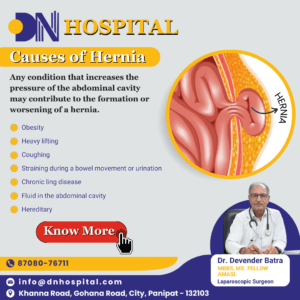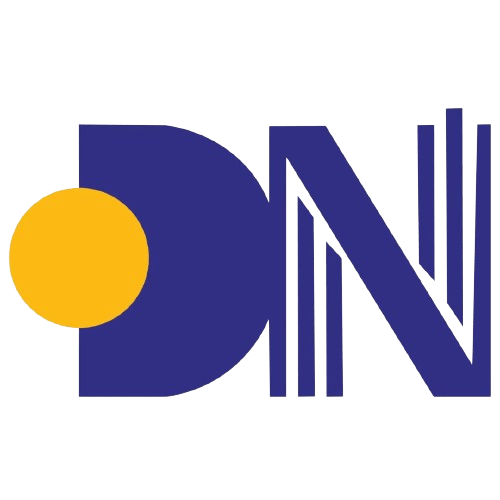Types of Hernia | DN Hospital

Hernias are a common medical condition where an internal part of the body pushes through a weakness in the surrounding muscle or tissue wall. Understanding the different types of hernias can help individuals recognize symptoms early and seek appropriate treatment. At DN Hospital, we specialize in diagnosing and treating various types of hernias with advanced laparoscopic and minimally invasive techniques, providing faster recovery and minimal discomfort for our patients.
1. Inguinal Hernia
An inguinal hernia occurs in the groin area, where tissue, like part of the intestine, pushes through a weak spot in the abdominal muscles. It’s one of the most common types, especially in men. Symptoms include a bulge on either side of the pubic bone, pain in the groin, and discomfort that worsens with activities like bending or lifting. Left untreated, an inguinal hernia can lead to complications, making timely intervention important.
2. Femoral Hernia
Femoral hernias are similar to inguinal hernias but occur lower in the groin, where the femoral artery and vein pass through the muscle wall. Femoral hernias are less common than inguinal hernias and are more likely to affect women. Symptoms may include a visible lump or a feeling of heaviness in the groin. Due to their location, femoral hernias can become serious quickly and often require surgical repair.
3. Umbilical Hernia
Umbilical hernias occur when part of the intestine bulges through the abdominal wall near the belly button (navel). They are common in infants but can also affect adults, especially those with obesity or a history of pregnancy. Symptoms include a bulge near the navel that may be more noticeable when coughing or straining. While many umbilical hernias close on their own in infants, adults often require surgical repair to prevent complications.
4. Hiatal Hernia
In a hiatal hernia, part of the stomach pushes through the diaphragm and into the chest cavity. This type of hernia is associated with gastroesophageal reflux disease (GERD), where stomach acid flows back into the esophagus. Symptoms include heartburn, difficulty swallowing, and chest pain. Lifestyle changes and medication can sometimes manage mild hiatal hernias, but severe cases may require surgical intervention.
5. Incisional Hernia
An incisional hernia can develop at the site of a previous surgical incision if the muscle tissue hasn’t healed completely. This type of hernia is more likely to occur in people who are overweight, pregnant, or physically inactive after surgery. Symptoms include a bulge or discomfort at the incision site, which can worsen with activity. Surgical repair may be recommended to reinforce the muscle wall and prevent further issues.
6. Epigastric Hernia
Epigastric hernias occur in the upper abdomen, between the belly button and the lower part of the ribcage. They are caused by a weakness in the muscles of the upper abdominal wall, allowing fat or tissue to push through. Epigastric hernias can be small and asymptomatic, but they may cause pain, especially when straining. Treatment often involves surgery to prevent complications.
7. Spigelian Hernia
Spigelian hernias occur along the side of the abdominal wall, below the navel, in an area known as the Spigelian fascia. Unlike other hernias, Spigelian hernias are less likely to form a visible bulge and can be harder to diagnose. Symptoms may include abdominal pain and discomfort. Since they are prone to complications, timely surgical repair is often recommended.
—
Why Choose DN Hospital for Hernia Treatment?
At DN Hospital, we provide expert diagnosis and advanced treatments for all types of hernias. Our specialized team offers both open and laparoscopic hernia repair options, ensuring patients experience reduced recovery times, minimal scarring, and effective results. With a focus on quality care, safety, and patient comfort, DN Hospital is a trusted name in hernia treatment.
If you suspect you have a hernia or need guidance on the best treatment approach, our specialists are here to help. Contact us to schedule a consultation and start your journey toward recovery.
